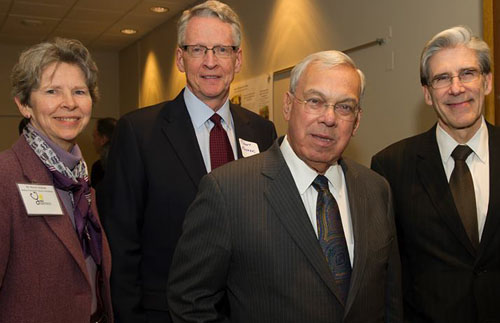Mayoral Prize for Innovations in Primary Care Ceremony Celebrated at BUSM

Mayor Thomas M. Menino and Dr. Paula Johnson, Chair of the Board of the Boston Public Health Commission, honored recipients of the 2013 Mayoral Prize for Innovations in Primary Care at a reception hosted by the Boston University School of Medicine. The annual celebration, now in its fourth year, raises awareness about best practices for improving the delivery of primary care services in health care, community-based and workplace settings.
“Five years ago we convened a task force of leaders from health care, academia and the community to create a roadmap for improving Boston’s primary care system, and I couldn’t be more proud of the successes we’ve had since then,” Mayor Menino said. “Access to affordable health care is a hot button issue these days, but Boston will continue to be a model for other cities thanks to innovative efforts like those of our award winners.”
This year’s awardees included Boston Medical Center’s (BMC) Office-Based Opioid Treatment program (OBOT). It received the Mayoral Prize for Innovations in Primary Care in a health-care setting for expanding access to addiction treatment. BMC’s OBOT, the largest such program in New England, provides medication-assisted treatment integrated into primary care and targets underserved hard-to-reach patients in a setting that also reduces the social stigma associated with substance abuse treatment.
The model relies on physician-supervised nurse care managers, which has dramatically improved access to addictions treatment. Within a year of opening, the hospital eliminated a treatment waiting list that exceeded 300 patients. Patients now can access treatment within 1-4 weeks of their first contact.